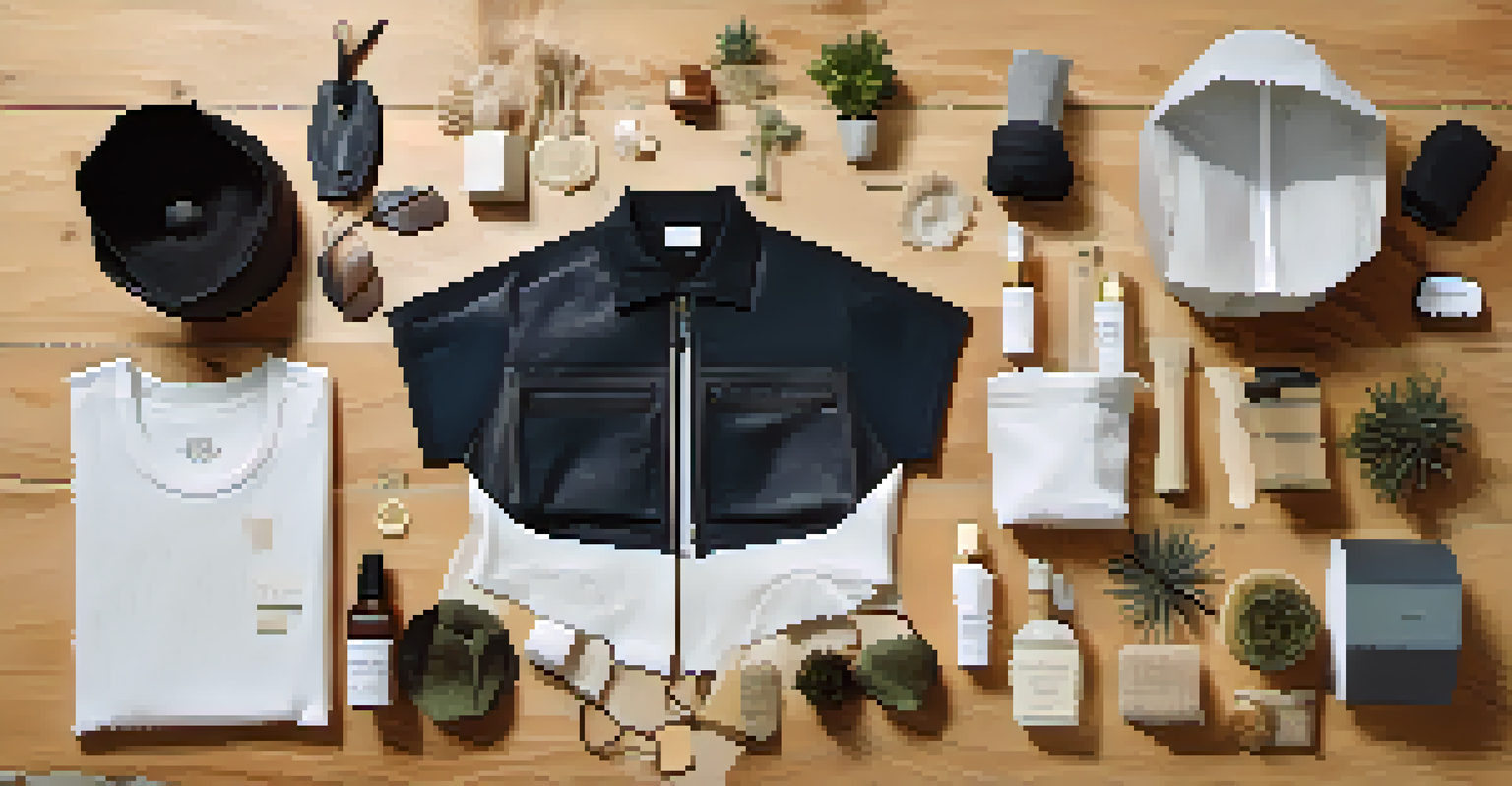Luxury Brands Pioneering the Zero-Waste Movement

The Rise of the Zero-Waste Philosophy in Luxury Fashion
In recent years, the zero-waste philosophy has gained significant traction, even among luxury brands. This movement focuses on minimizing waste by rethinking production processes and materials. Brands are now challenged to innovate while adhering to this sustainable mindset, which is reshaping the luxury landscape.
There is no beauty in the finest cloth if it makes hunger and unhappiness.
For many, luxury and sustainability seemed at odds, but this paradigm is shifting. High-end brands are discovering that eco-conscious practices can coexist with exclusivity and elegance. By adopting zero-waste principles, they can appeal to environmentally aware consumers without sacrificing their brand identity.
This transformation is not just about aesthetics; it's about a commitment to the planet. Luxury brands are using their influence to set examples for other sectors, proving that sustainability can be a key part of their core values while maintaining their prestigious image.
Innovative Materials Driving Zero-Waste in Luxury
One of the most exciting aspects of the zero-waste movement is the innovative materials being used by luxury brands. From organic cotton to recycled polyester, these materials are often sourced sustainably, reducing the environmental footprint of production. This creative use of resources demonstrates that luxury can indeed be eco-friendly.

Moreover, some brands are exploring unconventional materials, such as upcycled leather or even waste-derived fabrics. By repurposing what would otherwise be discarded, they not only minimize waste but also tell a compelling story about each product's journey. This narrative resonates with consumers who value authenticity and sustainability.
Luxury Meets Sustainability
Luxury brands are increasingly embracing the zero-waste philosophy, proving that eco-conscious practices can coexist with high-end style.
As these innovations gain popularity, they challenge the traditional notions of luxury. Consumers are now more informed and are looking for brands that prioritize sustainability, driving luxury brands to rethink and revamp their material choices.
Notable Luxury Brands Committing to Zero-Waste
Several luxury brands are leading the way in the zero-waste movement, showcasing how high fashion can be sustainably chic. For instance, Stella McCartney has long been a pioneer, integrating eco-friendly practices into her brand's DNA. Her commitment to using sustainable materials and practices has set a benchmark for others in the industry.
Sustainability is no longer about doing less harm. It’s about doing more good.
Another example is Gucci, which has committed to reducing its environmental impact across the board. The brand's initiatives include a focus on circularity, ensuring that products can be reused or recycled at the end of their life cycle. This proactive approach not only helps the environment but also enhances their brand loyalty.
These brands are not alone; many others are stepping up to embrace zero-waste philosophies. As they showcase their commitment, they're inspiring a broader movement within the luxury market, encouraging other companies to follow suit.
Zero-Waste Production Techniques in Luxury Fashion
Luxury brands are adopting cutting-edge production techniques to implement zero-waste strategies effectively. One notable approach is pattern-making, where designers create patterns that yield minimal offcuts. This meticulous planning can drastically reduce fabric waste, making the production process more sustainable.
Additionally, brands are exploring made-to-order models, ensuring that garments are only produced when there is a confirmed demand. This strategy not only cuts down on waste but also fosters a deeper connection between the consumer and the product. Each piece becomes a unique reflection of individual style and preference.
Innovative Materials Drive Change
The use of sustainable and unconventional materials, like upcycled leather, showcases how luxury can be both stylish and environmentally friendly.
These techniques represent a significant shift in how luxury fashion operates. By prioritizing sustainability in their production processes, these brands are paving the way for a future where luxury and responsibility go hand in hand.
Consumer Demand for Sustainable Luxury
Today's consumers are increasingly demanding sustainable options, particularly in the luxury sector. This shift is driven by a growing awareness of environmental issues and a desire to make responsible purchasing decisions. As a result, luxury brands are responding by prioritizing sustainability in their offerings.
Not only do consumers want products that look good, but they also seek brands that align with their values. This shift has led to a rise in transparency, with brands sharing their sustainability goals and progress with customers. In turn, this fosters trust and loyalty among consumers who want to support ethical practices.
As this demand continues to grow, brands that embrace sustainability are likely to thrive. The luxury market is evolving, and those that fail to adapt may find themselves left behind in an increasingly eco-conscious world.
The Role of Education in the Zero-Waste Movement
Education plays a crucial role in advancing the zero-waste movement within luxury brands. As consumers become more informed about sustainability, brands must also educate themselves and their teams on responsible practices. This knowledge enables them to implement effective strategies that minimize waste without compromising quality.
Moreover, many luxury brands are investing in educational initiatives for their customers. By sharing information about sustainability and the importance of zero waste, they empower consumers to make informed choices. This educational aspect can enhance the customer experience and promote a culture of sustainability.
Consumer Demand Shapes Luxury
As consumers seek sustainable options, luxury brands are prioritizing transparency and ethical practices to align with their values.
Ultimately, education fosters a greater understanding of the impact of luxury fashion on the environment. As brands and consumers learn together, they can work towards a more sustainable future, reinforcing the idea that luxury can indeed be responsible.
Challenges Luxury Brands Face in Going Zero-Waste
Despite the progress being made, luxury brands face significant challenges in fully committing to zero-waste practices. One of the primary obstacles is the inherent tension between maintaining luxury standards and adopting sustainable practices. High-quality materials and craftsmanship often come at a cost, making it difficult to balance sustainability with traditional luxury expectations.
Additionally, the complexity of supply chains in the luxury industry can hinder efforts to minimize waste. Sourcing sustainable materials, ensuring ethical labor practices, and maintaining quality control can be daunting tasks. Brands must navigate these challenges while still delivering products that meet their customers' expectations.

However, overcoming these hurdles is essential for the future of luxury fashion. By addressing these challenges head-on and finding innovative solutions, luxury brands can not only reduce waste but also redefine what luxury means in a modern, sustainability-focused world.